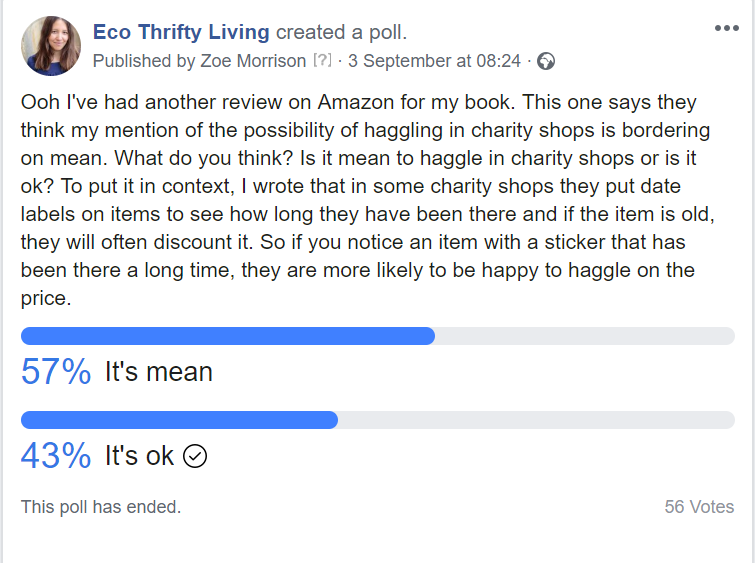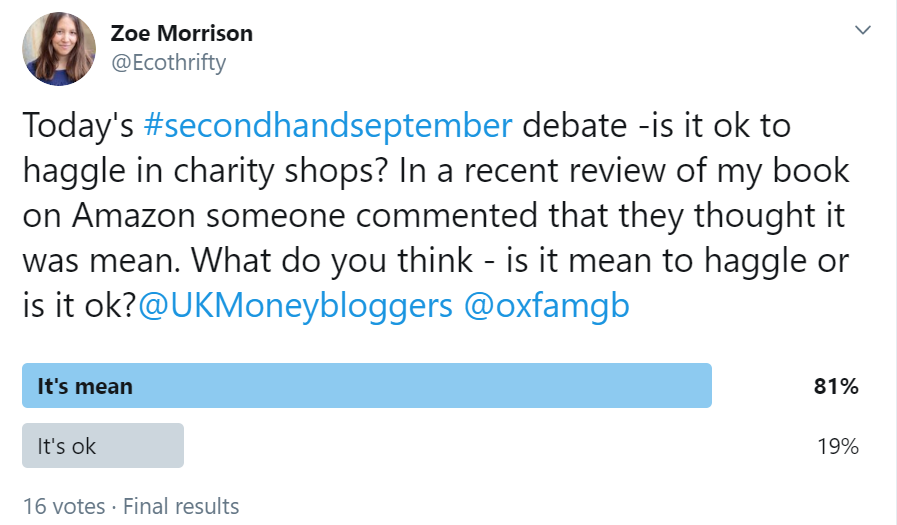
Is it ok to haggle in a charity shop?

Twitter and Facebook survey
In my Eco Thrifty Living book, I advocate buying secondhand to save pennies and the planet. I also mention that is you are more likely to be able to haggle in a charity shop if something has been in the shop for a while.

I recently got a comment on a review of my book on Amazon, saying they thought it was bordering on mean to haggle in a charity shop. I was really intrigued by this. I personally think it is ok to haggle in charity shops at times and I am going to give my reasons for that at the bottom of the post. But first I wondered what other people thought.
I opened up the debate to Twitter, to my Facebook page and to the UK Money Bloggers group. I also went and spoke to the manager of a local charity shop in person. As you can see on Facebook out of 56 people 57% thought to haggle in a charity shop is mean and 43% think it is ok. On Twitter, 16 people replied and of them 81% of them think it is mean and 19% think it is ok.

What do the UK Money Bloggers think?
Here’s what they thought:
Some were not in favour of haggling in a charity shop:
I personally wouldn’t feel right haggling in a charity shop. It just doesn’t feel comfortable for me when the proceeds are going to a good cause. I agree that they’re often expensive for some things but I just tend not to buy something in a charity shop if it’s too expensive. I’m all for haggling but tend to only haggle on big purchases like insurance, utilities, second hand cars etc. I usually use comparisons to back up my position a bit too. https://penniesforthepiggybank.com/
Hi, l am all for haggling when it comes to online marketplaces and will always come prepared with online price comparisons for the large shops, for example when buying electrical goods. However, when it comes to charity shops l would feel a little uncomfortable as l know l could afford it and the workers are volunteers. If I felt it was overpriced l would opt not to buy it. Car boot sales – now that’s a different story! It’s all about the haggle! littlemissfrugal.co.uk
I don’t think I’d ever haggle in a charity shop if I’m honest. I just don’t think I’d feel right doing it. There are charity shops that are over-priced, I get that but I’d rather just pay the price asked or leave it completely than ask someone who’s volunteering their time for free (usually) if they can reduce the price. I’m lucky in that I shop in charity shops because I love a good bargain rather than out of necessity though so I understand why others might choose to haggle – it’s not for me though. Www.frugalfamily.co.uk
I’ve never haggled in a charity shop. You’re still getting items cheaper than you would pay normally and it’s a great way of helping other people by buying things in these shops. https://suefoster.info
Personally, I wouldn’t haggle in a charity as the money is for a good cause and I can afford to pay the full price. Anywhere else, haggling is fine for me. For people who are on a tight budget, I think it’s OK to haggle in a charity shop because charities are supposed to help these people https://monethalia.com

Some think it’s ok to haggle in a charity shop:
I personally think charity shops are quite overpriced compared to back in the day when they first started popping up in towns. They have reduced overheads and all their stock is 100% free, I don’t see any harm what so ever in asking for a reduction in price. They don’t have to agree and might be glad to get rid of something that’s been hanging around for a while. You never know! https://www.dailydealsblog.co.uk
Interesting point. I agree with the above in saying that a lot of charity shops are a rip off. Some in Edinburgh charge more for second-hand stuff than brand new (Mr Men / Little Miss mugs being a case in point – they were cheaper in Aldi new). They are commercially driven on sales and targets yet pay very little in overheads and get everything for nothing anyway, so why not? There was a time when I frowned upon it but I think it’s fair game now. www.thegrumpygit.com
I managed a charity shop for a while and people haggled all the time. I think sometimes people forget that charity shops are supposed to work both ways – the charity raises money and people who can’t necessarily afford things can buy them. I don’t really see a problem, sure if it’s taking the mick wanting money off something that’s really cheap anyway that’s not really on, but otherwise I think it’s ok, especially for larger things like furniture etc. https://missmanypennies.com
I haggle whenever possible because the worst that could happen is that I am told no. I tend to buy used items and haggling saves me about 10-20% each year. In my opinion, it is nothing to feel shy about. I only haggle in charity shops when buying multiple items. This is because they need all the money they can get in order to carry out their activities. olivermoney.com
Some say it depends:
Hello! My personal feeling is that I would feel tight haggling on something in a charity shop when the proceeds are going to charity and those who are less fortunate. I have however asked for a discount on something when there has been a mark or a repair that’s needed thriftylondoner.com
For me it would depend on the charity shop’s prices and what I was buying. If it’s a more expensive or harder to get rid of item like furniture then I’d try my luck at haggling a better deal (if it wasn’t already super cheap). If it’s just clothing then in most charity shops I go to they are reasonably priced so I wouldn’t bother asking, I’d actually be a little embarrassed. If a top costs £5 and seems expensive to me but all others are priced similarly, it would be unfair for me to try and get it cheaper if others are paying £5. Hope that makes sense! www.studentskint.com
Normally I wouldn’t haggle in a charity shop, as the prices are already good value and I’m glad the money is going to great causes. But I have asked when buying a bigger and more expensive item like a sofa. https://www.muchmorewithless.co.uk

Comments on Twitter included:
- @MrsMummypennyUK Yes!! Haggle I say. But I negotiate everywhere
- @themoneyshed nah not at all How does it benefit the charity if the customer gives them less money (so more often than not they can then go on and flog said item on ebay!)
- @ibeatdebt I don’t haggle in charity shops, whether it’s to resell or not. I wouldn’t feel right.
Thoughts from the manager of a local charity shop near me
I wanted to get an in person opinion from someone on the front line of what their thoughts were on haggling in charity shops. I spoke to the manager of a charity shop local to me and she gave me some really useful background info about her shop.
8 out of every 10 items donated can’t be sold in the shop!
She manages a really large shop and each day they get 400 – 700 new (to them) items in the shop. In the past 8 out of every 10 items donated were saleable in the shop, but these days it is closer to 2 out of 10 items. They have a minimum price that they can afford to sell items at to be able to cover shop costs and make a profit.
Because of pound shops and cheap clothing stores, she said the quality of stock has been diluted. They can’t sell on these items because they would have to charge less than their minimum price. They put date labels on all of their stock that will be sold in the shop and in general she said, if it hasn’t sold within 3 days, it is unlikely to.
Stock gets cleared out every 2 weeks
Every 2 weeks, they have a shop clear-out of old stock and pass it on to other shops to be sold. Anything that doesn’t get put out to be sold in the first place, or that doesn’t eventually sell in one of the shops gets sold on to textile traders or goes to landfill if it can’t be sold on – more on that in a bit.
The needs of the charity, the volunteers, the donors and the customers all need to be considered.
The manager said that she had worked in the shop a long time and over the years she has built up relationships with donors and customers, including customers who are eBay sellers.
Staff members are told not to get involved in haggling. They are mostly volunteers and she pointed out they don’t get a staff discount, so it might not seem fair to them if they could give customers money off, but not themselves. That doesn’t mean that you can’t ask for money off, but you would need to speak to the manager as she is the only one who can authorise it. She agreed with me that if an item is new – as per it’s date label she is unlikely to haggle on the price, but if it has been there a while she is more inclined to.
She said they have to be careful about giving discounts on items because as I mentioned they have built up good relationships with loyal donors over the years who donate good stuff because they like the charity. They might be offended if they are in the shop and they see their stuff being haggled over. She said that people choose the shop she manages over others because as well as wanting to support the charity they like knowing that it won’t be sold off too cheaply.

Ebay traders vs textile traders
However, as I mentioned only around 2 out of 10 items being donated actually end up being sold in the charity shop. The items that don’t get sold will raise far less money for the shop when sold to a textile trader, or even nothing if they end up in landfill. So someone coming in looking for bargains to sell on eBay is actually providing a service to the charity shop by taking stuff off their hands. The manager said that she almost treats them like wholesale customers and will give them good deals after stock has hung around for a bit (i.e. not sold within the first few days), because they are repeat, bulk and regular buyers.
Ebay traders pay more for items than textile traders do
I don’t think eBay traders shopping in charity shops is a bad thing (and the manager I interviewed doesn’t either). To put it in perspective, a textile trader might pay £5 for a whole big bag full of stuff. An example of textile trader paying this kind of money is wejustrecycle (you can cut out the middle man and sell to them directly yourself). However, an eBay trader might pay £5 for one item or even 5 items, but that is better than £5 for 30 items (or however much you can fit in a big bag)!
I don’t think the eBay trader is any less worthy of earning a living than a textile trader and the eBay trader makes more money for the charity shop.
Textile traders are going out of business
Another problem with textile traders, is that they are going out of business. There are lots of problems with importing our clothing overseas and some countries are/ have banned it. Our used clothes have flooded their markets and ruined local textile industries in some places. They have also got fed up with the poor quality clothes and items we are now sending over that won’t last. Read more here: Used clothes: Why is worldwide demand declining.
With textile traders going out of business, what will happen to the stuff that isn’t sold? It will end up in landfill or incineration (unless alternative solutions are found). In landfill any natural fibres will decompose and produce methane – a very potent greenhouse gas. Read more on that here: how what we throw in the bin contributes to the climate crisis.

Do charities just raise money for good causes?
Some charities give more of the money donated to them to good causes than others. This is because some charities spend more on overheads than others. Think of the amount of money spent on marketing campaigns for charities like Cancer Research. Plus there is controversy over charity shops selling new items and competing against businesses who have to pay higher rates. Further reading here: How much do charities spend on good causes? What percentage of donations go to charity (not UK) Quite an old article, but may still have relevance – Charity shops and the cash that won’t reach the needy.
The point is that only a percentage of the money you spend in a charity shop goes to the cause. The rest goes to overheads including directors salaries. In that context the next time you consider paying over the odds for something in a charity shop, you might want to think about what the percentages are like in that charity and what else your money is funding.
So is it ok for an individual to haggle in a charity shop?
I personally think it is ok for anyone to attempt to haggle in the right circumstances. I don’t think that an eBay trader, a textile trader or an individual rich or poor has any more or less claim to haggling. Between 70 and 90% of stuff donated is never sold in a charity shop. With the decline in the textile trade, unless alternative solutions are found, more will end up in landfill or incineration and contribute towards the problems of global warming. If haggling helps reduce that, then I’m all for it!
Of course haggling is tiny part of a solution to a far wider problem. However I think the majority feeling that it is mean to haggle in charity shops highlights a widespread lack of awareness of how much stuff ends up not being able to be sold and what really happens to our charitable donations. We think we are solving a problem by recycling / donating our unwanted things, but the real solution to the problem is to take heed from Vivienne Westwood and to ‘buy less, choose well and make it last’! There is also a lack of awareness of how much of our money we spend in the shop is actually going to the charity. These things aren’t transparent when you visit a charity shop.

Points to bear in mind if attempting to haggle
It can come across as rude at times
Above I said that haggling is ok in the right circumstances. Sometimes it can come across as rude i.e. if you are asking for too much off (especially if you ask them to go below the minimum price for the shop), if the item is new in, or if you get in a huff about not being given a discount. Also if you want the item, think it is priced fairly and you can afford it, then why would you need to haggle?
Haggling might save something from not being sold
But if you aren’t really that fussed about buying the item at it’s current price, you are under no obligation to buy it. You could just walk away and a lot of people will, meaning the item could have a lower chance of being sold. In this circumstance, I think haggling is actually a bit of useful customer feedback.

How to haggle successfully
If you are going to haggle, I think it is really important to be polite and to remember that although you can ask for a reduction in price, the charity shop worker (most likely a volunteer) has every right to say no. They may have been told they aren’t allowed to haggle and that you will need to speak to a manager. To avoid upsetting a volunteer, it may be best to ask first what the policy on haggling is/ who the right person to speak to is, before you launch into it.
If you try to haggle over something that has just arrived in the shop, you probably won’t have much luck, but there are times when you are more likely to be successful. These are as follows:
- when an item is overpriced
- when you are buying a large item like furniture
- when an item has a date sticker on it that shows it has been in the charity shop a bit too long.
- When you are buying in quantity

In summary
The majority of people I surveyed did think it was mean to haggle in charity shops. My personal feeling is there are lots of good reasons to haggle in a charity shop under the right circumstances. To summarise, this is because:
- Most of the stuff we donate to charity is never sold in charity shops.
- Private textile traders and eBay sellers make livelihoods out of our unwanted charitable donations and they are actually providing a useful service. They help keep stuff out of landfill longer. Haggling can also be useful, if it means an item is sold that wouldn’t have been otherwise.
- With the lack of global demand for our unwanted textiles and other goods, a lot more of our stuff may be destined for landfill where it can contribute towards the climate crisis.
- Not all charities are equal, some keep as much money from your purchases for the cause as possible and others spend a questionable amount on overheads. There might be a better way to get your money to a good cause than paying over the odds in a local charity shop.
There is a bigger problem highlighted here, regardless of whether it is mean to haggle in a charity shop or not. Donating to charity is quite often not the fairy tale ending to our unloved items we might hope for. We need to wake up to that and to stop buying cheap products that aren’t designed to last! Plus we need more transparency in charity shops about what happens to our unwanted donations and how the money raised through charity shops is spent.
If you are starting out on your journey towards saving money and the environment, I have written an introduction to the eco-thrifty life and it is available for purchase here: Eco Thrifty Living book . If you do buy it and read it, I would really appreciate it if you left me a review – thanks!




